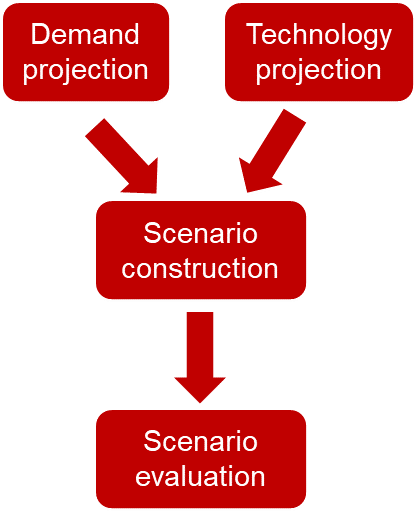5) Scenarios
Step five involves developing and narrowing down technical scenarios that can lead to the realisation of a carbon neutral H&C sector. Scenarios may be extreme (best-case/worst-case) or particularly relevant or typical.
The goal is to identify scenarios for which the stakeholders are strongly committed and which have a high chance of success.
For the development of scenarios for H&C planning, the first step is to make projections. On the one hand, on possible developments of future H&C demand; on the other hand, on possible future developments of H&C production (i.e. supply).
For the construction of scenarios, the projections are then varied and combined with each other in different ways. For example, renovation activity can be assumed to be higher or lower, the connection rate to district heating can be varied, etc.
Usually, target scenarios are developed, i.e. those that achieve the goal of a carbon neutral H&C sector.
The developed secanrios can be analysed and compared using various key indicators. A common key indicator is the cost of heat. However, it is more important to discuss the opportunities and risks of the developed scenarios with the administration, municipal utilities and other stakeholders.
Here, different aspects of the local heat transition strategy can be highlighted and a better understanding of the future challenges can be provided. For example, a SWOT analysis may be used for this aim. After the comparison, a scenario should be agreed on. On this basis, measures or options for action should be developed on how these scenarios can be achieved.
Scenario construction and analysis
Tools / Literature on Scenarios
- American Planning Association (2021): Scenario Planning. https://www.planning.org/knowledgebase/scenarioplanning/
- Dieckhof et al. (2016): Consulting with energy scenarios. https://energiesysteme-zukunft.de/en/topics/energy-scenarios
- Prohaska et al. (2020): D6.3 Heating and cooling strategies for pilot cities – Frankfurt. Chapter 6. https://www.hotmaps-project.eu/wp-content/uploads/2020/10/Hotmaps_D.6.3_Frankfurt-HC-Strategies_FINAL_reduced.pdf
Subscribe to our Newsletter

This project has received funding from the European Union’s Horizon 2020 research and innovation program under grant agreement No 101033706. The sole responsibility for the content of this website lies with the Act!onHeat project and does not necessarily reflect the opinion of the European Union.





